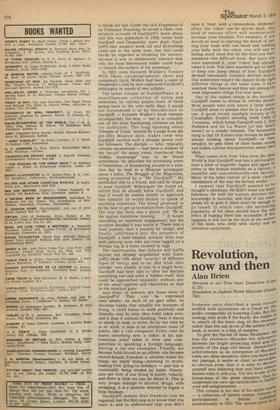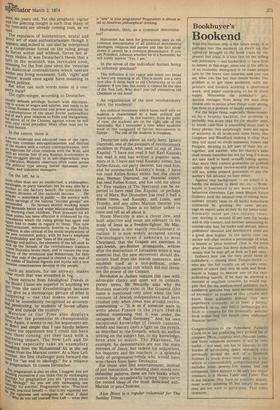Revolution, now and then
Alan Brien
Marxism in our Time Isaac Deutscher (Cape £1.25) Revolution in Judaea Hyam Maccoby (Ocean 75p) Someone once described a book review stuffed with quotations as a fraud op the public comparable to watering Coke. But the analogy only holds if the buyer, the reader, is in search of the basic slag of the reviewer rather than the eau de vie of the author ofthe book. A review is a bag of samples. To give the flavour of Isaac Deutscher, the less the reviewer obtrudes his silhouetute between the bright projecting mind and °Joe screen of the page the better. Deutscher s achievements as an interpreter of Marxistrld today are often deceptive. After you have rea any passage, it seems so clear, so inevitable, so obvious even, that it is easy to deceives yourself into believing that you have alwarle known what it tells you. Yet this is one of t litmus-tests of the great educator, that suppresses his own ego-satisfaction to further your self-enlightenment. This volume is not one of his major vvor_sr p—taiccipoallteicotnison of sixteen essays, lecturesheu u, participations in debate Publi.
s s posthumously in 1972. The newest piece 1
least six years old. Yet the prophetic vigour and the piercing insight is such that many of his forecasts are already coming true, as we read.
The expulsion of Solzhenitsyn, brutal and direct act of state authoritarianism though it appears, and indeed is, can also be interpreted
as a compromise forced on the ruling group PY forces within and without, forces not al ways visible. It was Deutscher's thesis that a Split in the monolith was inevitable soon, releasing for the first time since the 'twenties th.e dialectical contradictions which operate .vithin any living movement. 'Left,' right' and centre' would once again have meaning in Soviet politics. /3ot what can such words mean in a oneParty state?
The right-winger, according to Deutscher,
Usually defends privilege, favours wide discrepancies in scales of wages and salaries, and tends to be Great Russian chauvinist and power politician; he Is contemptuous of the small Soviet nationalities ,r1c1 of such poor relatives as Poles and Hungarians, eout above all of the Chinese, against whom he will .ven vent racial prejudice. More often than not he IS anti-Semite.
In the centre, there is
!more moderate and educated man of the right, who may combine anti-egalitarianism and distrust
Of the masses with a certain cosmopolitanism, with
dfl. eagerness for close relations with the West, and th an intense fear of any Russian involvement in lass struggles abroad, or in anti-imperialistic wars liberation. Western observers often come across „tu„,IS Political type among Soviet diplomats, jour
"dusts, and industrial managers. On the left, he is
More often than not an intellectual, a philosopher, sociologist, or party historian; but he may also be a
Worker at the factory bench. He criticises the
Present division of the national income . . He at,tacks — sometimes in public — the secrecy with
Wnich earnings of the various "income groups" are
surrounded . . . He favours shorter working hours .r1c1 demands better and wider educational facilities working-class children. That pressure on all 'nese points has been effective is evidenced by the
c •
°ncessions which the ruling group has again and again had to make in regard to them. This new galitarianism, inherently hostile to the Stalin trl,adition, is also critical of the social implications of 0"e new economic policy, with its heavy emphasis icril profitability and the "laws of the market ... " In 0;e2logY and politics, the elements of the left seek to UP the threads of the revolutionary tradition h!iere Stalinism broke them, and to restore the true IstorY of the revolution and Bolshevism, for they jl'el that only if the ground is cleared to the end of s e nibble of Stalinist legends and myths will a new ocialist consciousness develop in the people. c,SUch an analysis, for me anyway, makes 'ear much that was wreathed in fog. tiThose extracts from Ideological Trends in "Soviet Union are superior to anything we f,et from the usual Kremlinologist because give us a stereoscopic picture of what is ,aPPening — one that makes sense, and 'ould be immediately recognised as accurate rIcl Penetrating, by students of Soviet affairs Side and outside the country. Marxism in Our Time also displays reutscher the polemicist in championship arrn. Again, it seem S to me, his arguments are "w' direct and simple that I can hardly believe riej ther his opponents nor I could not have ;Leen them coming, yet they land with a attering impact. The New Left and Dr tMarcuse especially take an exemplary thrruashing from the Muhammad Ali in the red s nks from the Marxist corner. At a New Left Minar, the first challenger puts forward the oh`cd for "an end to ideology," for a reliance " Pragmatism. In comes Deutscher: deI3, ut pragmatism is also an idea. I suggest you are • 'tiding yourselves if you think that by exchanging 140,
fi`°gY for pragmatism you are "getting away kr' ideology;" no, you are only exchanging one
suenel°gY for another. Pragmatism says: "Practical for‘cess, practical benefit — that is my supreme test " Why rightness and wrongness of what I think ...y do you call yourself New Left — what then
is "new" in your programme? Pragmatism is almost as old as American philosophical thinking.
Humanism, then, as a common denominator?
Humanism has been for generations seen as the common denominator of all political movements ideologies, religions and parties and this fact alone shows it cannot be a common denominator. If you ask President Johnson whether he is a humanist, he will surely answer "Yes, I am."
In the sense of the individual human being as infinitely precious?
This definition is too vague and much too broad to have any meaning at all. This is surely not a very new idea. It dates back to old Christianity or to old Judaism, if you like, but surely it cannot be the idea of the Neu, Left. Why don't you call yourselves 'old Christians or old Jews?
An organisation of the new revolutionary force, the students?
Any political movement which bases itself only on students is characterised by a basic political and moral instability ... In this country, from my point of view, the students are on the right side of the barricades. But I remember a time when students were in the vanguard of fascist movements in Europe .. . The role of the students is transient.
Deutscher tells about an early hero, Ignacy Dazynski, one of the pioneers of revolutionary socialism in Poland, who used to say of Das Kapital: "I have not read it but Karl Kautsky has read it and has written a popular sum mary of it. I have not read Kautsky either; but Kelles-Krauz, our party theorist, has read him, and he summarised Kautsky's book. I have not read Kelles-Krauz either, but the clever Jew, Herman Diamand, our financial expert, has read Kelles-Krauz, and has told me about it." Few readers of The Spectator can be ex pected to have read Das Kapital or perhaps any of Marx. But Deutscher has read it half a dozen times, and Kautsky, and Lenin, and Trotsky, and any other Marxist theorist you could mention. There is no better talker to come and tell us all about it.
Hyam Maccoby is also a clever Jew, and both adjective and noun are relevant to his study of Jesus as a freedom-fighter. Mr Mac coby's thesis is not exactly revolutionary in outline. It is now widely accepted among Christologisfs (even if unknown to most Christians), that the Gospels are exercises in anti-Jewish, pro-Roman propaganda, written after the destruction of Jerusalem when it was essential that the new movement should dissociate itself from the Jewish resistance, and
establish itself as a non-political, otherwordly, multi-racial cult-which did not threaten the power of the Caesars.
Revolution in Judaea restates this case with admirable clarity and quiet wit in contemporary terms. Mr Maccoby asks why the Romans scarcely exist in the Gospels (the name is mentioned only once when the last remnant of Jewish independence had been crushed only when Jesus was around twelve, commenting — "It is as if someone were to write about France in the years 1940-45 without mentioning that it was under the occupation of Nazi Germany." And his own exceptional knowledge of Jewish customs, beliefs and history casts a light on the events, as described in the Gospels, which no author writing on the subject has, to my knowledge, been able to match. The Pharisees, for example, he demonstrates are not the main enemies of Jesus, but indeed his supporters, his inspirers and his teachers — a splendid body of progressive rebels who would have won cheers from Isaac Deutscher.
For those who find entertainment, instead of just instruction, in bending their minds into unfamiliar patterns, these are two books which cannot help occasionally turning topsy-turvy the rooted ideas of the most dedicated antiMarxist or pro-Christian.
Alan Brien is a regular columnist for The Sunday Times.

































 Previous page
Previous page